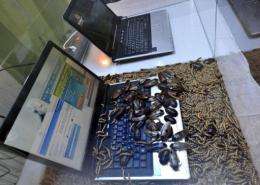'Hacktivity 2010' tackles computer security

A major anti-hacking conference wrapped up in Hungary Sunday after higlighting protection against increasingly sophisticated computer piracy as the Internet becomes ever more present in daily life.
"The Internet is the greatest generation gap since rock'n roll," world-renowned US cyber security expert Bruce Schneier told the two-day Hacktivity 2010 event in the capital Budapest.
"The older of us need to be prepared for a younger generation that lives life on the Internet, doesn't understand where their computer or smartphone ends and the Internet begins, shares passwords with their friends as a sign of trust and deliberately lies when registering for services," he said.
"At the same time, technological and business trends point to less user control: what will security and privacy look like in this new world?" he warned.
Some 30 presentations were scheduled over the two-day conference covering topics including database protection by softwares like Oracle, MySQL, MSSQL, DB2 LUW, Sybase, ASE and PostgreSQL.
Also of interest was the new concept of Web 2.0, which includes changes in the way the Web is used.
"Web 2.0 is a technology that is used more and more nowadays," said Csaba Krasznai, a former organiser of Hacktivity who now does research at Miklos Zrinyi National Defence University.
He said Web 2.0 posed a threat not just to individuals but also to companies and the state, and it was necessary to establish security measures "based on changes within society."
Smartphones like the iPhone and Blackberry were also discussed, with Hungarian security expert Domonkos Tomcsanyi noting that they could easily be pirated with a simple PDA, or palmtop computer.
US hacker Mitch Altman meanwhile demonstrated how, with a kit worth just a dozen euros (dollars), it was possible to remotely switch off a public television or charge any device with a USB port.
Organisers had expected about 1,000 participants at the conference.
(c) 2010 AFP



















